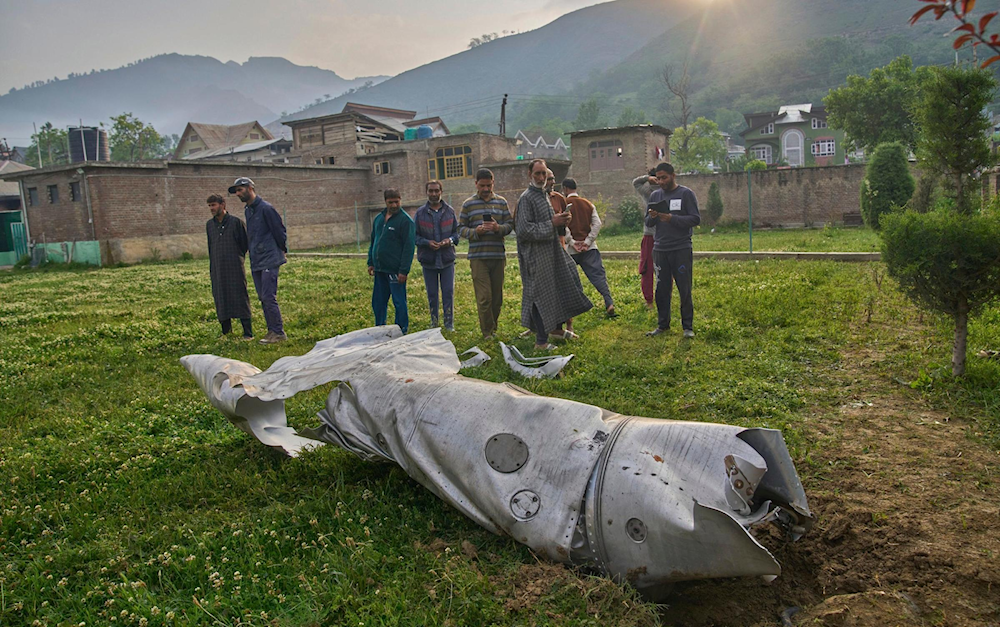Pakistan hails Chinese jets in repelling India strikes
Pakistan says it used Chinese J-10C jets to down five Indian warplanes amid escalating Kashmir tensions, warning of deeper conflict after India’s strikes.
-

A photo-journalist took pictures of what appears to be the wreckage of a downed fighter jet in Srinagar, the main city in Indian-occupied Kashmir, in an undated photo (AP/Dar Yasin)
Pakistan announced that it deployed Chinese-made J-10C fighter jets to shoot down five Indian aircraft in response to strikes carried out by India near the Line of Control, marking a sharp escalation in tensions over the disputed region of Kashmir, wrote Bloomberg on Wednesday.
Foreign Minister Ishaq Dar told parliament that the Indian aircraft included French-made Rafale jets, according to the Associated Press of Pakistan, even though India has yet to confirm any losses publicly. In turn, Dar added that Pakistan kept Beijing fully informed of its actions, with China’s Ambassador Jiang Zaidong visiting Islamabad’s Foreign Office at 4 am on the day of the strikes.
The airstrikes come in the aftermath of a deadly April 22 Pahalgam attack that left 26 civilians dead in the Indian-controlled portion of Kashmir. India labeled the incident an act of terrorism and blamed Pakistan for facilitating it, a claim Islamabad has rejected.
In response, India launched coordinated airstrikes early Wednesday against nine targets inside Pakistan, which it described as “precise and restrained” and “non-escalatory in nature.” However, the Pakistani army said that the strikes resulted in the deaths of 31 civilians and vowed a strong military response. Prime Minister Shehbaz Sharif also signaled the intent to retaliate, which was soon followed by reports of Indian jets being shot down.
Pakistan’s military claimed it downed three Rafales, a MiG-29, and an SU-30, although it has not provided supporting evidence. India’s Foreign Secretary Vikram Misri discussed the April attack and the ongoing investigation, but did not comment on the alleged downing of its jets.
Analysts suggest both sides may be managing the public narrative to control the pace of escalation, with some, like Ankit Panda of the Carnegie Endowment, stating that parity in retaliatory actions could prevent either party from pushing further.
China urges restraint while backing Pakistan militarily
China responded by calling India’s airstrikes "regrettable" and urged both sides to avoid further actions that could inflame the situation.
Beijing remains Pakistan’s largest arms supplier, responsible for 82% of its weapons imports between 2019 and 2023, according to the Stockholm International Peace Research Institute.
Ambassador Jiang Zaidong of China called on DPM/FM, Senator Mohammad Ishaq Dar @MIshaqDar50 early this morning. DPM/FM briefed the Chinese Ambassador on the serious situation following India’s unprovoked violation of Pakistan’s sovereignty and the tragic loss of innocent lives.… pic.twitter.com/4nfbCmxxVn
— Ministry of Foreign Affairs - Pakistan (@ForeignOfficePk) May 7, 2025
The reported use of Chinese J-10C jets in live combat quickly became a trending topic on China’s Weibo, with users praising the performance of domestic military hardware.
Shares of Chinese defense companies surged on the news, while Bloomberg Intelligence noted that the conflict could serve as a testbed for China’s relatively unproven weapons systems in live combat.
Hu Xijin, former editor of the Global Times, wrote that if the reports from Pakistan are accurate, they demonstrate China's military manufacturing now surpasses that of Russia and France, and suggested the outcome should alarm Taiwan.
Economic stakes rise amid risk of prolonged confrontation
While both nations possess formidable military capabilities, the economic dynamics are far less balanced.
India’s GDP is now more than eight times the size of Pakistan’s, according to World Bank figures, a gap that has widened significantly over the past two decades. India’s economy continues to expand rapidly, whereas Pakistan is still grappling with the aftermath of a deep financial crisis and is currently dependent on a $7 billion program to Pakistan from the International Monetary Fund.
The last time the two countries neared full-scale war was in 2019, following a suicide bombing that killed 40 Indian soldiers. India responded with its first airstrikes on Pakistani territory since 1971, prompting Pakistan to shoot down an Indian jet and capture its pilot, who was later released in a gesture aimed at de-escalation.
While a similar pattern may emerge this time, the deployment of advanced weaponry and heightened nationalistic sentiments could complicate any swift resolution.
US President Donald Trump, speaking at a White House event, described the renewed India-Pakistan conflict as "so terrible" and expressed hope for de-escalation. He added that the US maintained good relations with both nations and offered to mediate if needed, stating, "They’ve gone tit-for-tat, so hopefully they can stop now."

 4 Min Read
4 Min Read








